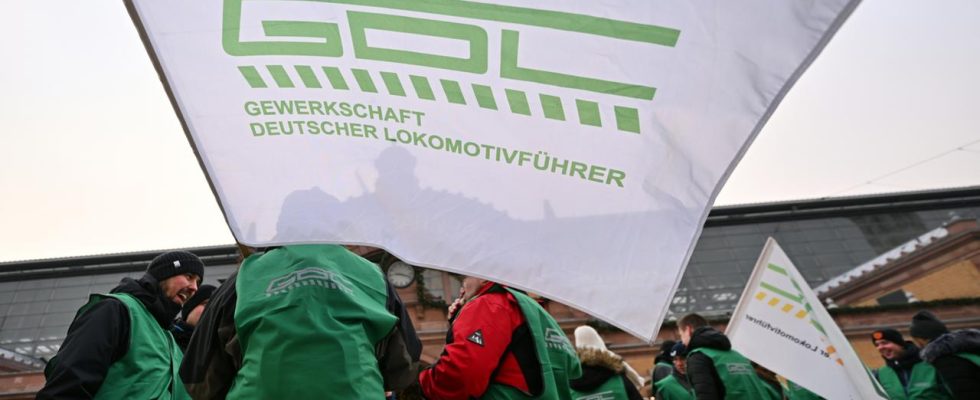analysis
After violent strikes, Deutsche Bahn and the train drivers’ union GDL are negotiating again. The positions are far apart. And an agreement could be expensive for the DB Group.
On paper, the positions of the parties in the collective bargaining dispute at Deutsche Bahn are far apart. The locomotive drivers’ union (GDL) is calling for a 35-hour week with full wage compensation for shift workers, plus 555 euros more wages and 25 percent higher allowances. In addition, there should be higher company pensions and a one-time tax-free inflation compensation bonus of 3,000 euros.
The GDL only wants to conclude the collective agreement for one year. For the railway employer, this would mean having to expose itself to new demands. The railway therefore wants to complete the deal over 32 months. During this period, wages should increase by a total of ten percent and working hours should decrease by one hour. In just under three years, that would add up to 13 percent. The one-off inflation compensation would be paid immediately.
Demands are far apart
Average income can be calculated from the railway’s published salary ranges. According to this, train drivers receive an average of 4,200 euros gross per month with all allowances, train attendants 3,800 euros and the staff in dining cars (“Gastros”) 3,250 euros. If, as required by the GDL, working hours were to fall from the current 38 to 35 hours with the same wage, that would be equivalent to a wage increase of around 8.5 percent.
The union is also calling for a general increase in wages of 555 euros. More pay for less work would mean an increase of 23 percent for the average train driver’s income, 24 percent for train attendants and 27 percent for restaurants.
The required increase in allowances by a quarter would lead to further wage increases. There are plenty of allowances at the railway: for example for overtime, Saturday work, Sunday work, night work, shift work and on-call duty. However, due to the lack of detailed figures, it cannot be calculated from the outside.
The 13 percent over just under three years that the railway offers is significantly less than 23 to 27 percent in one year, as required by the GDL. The train drivers’ union wants to hold new negotiations in a year with new demands; The railway wants peace and tariff security for 32 months.
More attractive employer who takes risks?
The train drivers’ union does not provide any calculations of its demands; She says that shorter working hours and higher wages ultimately benefit the company. “Without sufficiently qualified railway workers, the railway simply cannot function,” says GDL spokesman Stefan Mousiol. “The 35-hour week, combined with the five-day week, ensures a significant reduction in workload and will thus bring the desired and urgently needed boost to new employees.”
Deutsche Bahn sees rising personnel costs as a risk for its already loss-making core business. Around every fourth euro of turnover in the German rail business is spent on staff. That’s a high proportion in a technical company. In the official risk reports of the DB companies for long-distance, local and freight transport, risks are highlighted “due to higher collective bargaining agreements than with competitors, which represent an additional competitive disadvantage”.
Most employees stay for a long time
The company’s annual report writes about the “competitive job market” in which the railway tries to recruit and retain people using many means. The willingness of employees to switch from the state-owned Deutsche Bahn to private railway companies has been increasing for years to almost six percent.
However, the majority of the workforce is loyal to Deutsche Bahn. The staff, who are on average 44 years old, have been with the company for an average of 16 years. A large number of employees take part in internal personnel surveys. The railway claims that there is a high level of satisfaction.
Disparities within the company
The locomotive drivers’ union is only strong enough to conduct collective bargaining in 18 of the three hundred German railway companies. Around ten thousand of the total 210,000 German railway employees work in these 18 companies. While collective agreements from the large rival union EVG stipulate weekly working hours of 39 hours, GDL collective agreements already only work 38 hours.
There are exceptions. There are still many civil servants in the company from the days when the railway was an authority. 2,300 of the twenty thousand train drivers are civil servants. Since they are not covered by collective agreements for employees, they also work 39 hours per week in GDL companies.

